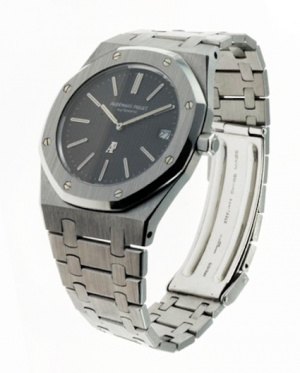Audemars Piguet Royal Oak: Difference between revisions
Created page with "==History of the 1972 Royal Oak== thumb|Royal Oak Ref:5402 1972 First Series At the very beginning of the seventies, Audemars Piguet, just like many ot..." |
|||
| Line 1: | Line 1: | ||
==History of the 1972 Royal Oak== | ==History of the 1972 Royal Oak== | ||
[[File:AP RO 1972.jpg|thumb|Royal Oak Ref:5402 1972 First Series]] | [[File:AP RO 1972.jpg|thumb|Royal Oak Ref:5402 1972 First Series]] | ||
At the very beginning of the seventies, Audemars Piguet, just like many other Swiss watch manufacturers, was facing an existential threat. Quartz watches from Japan had lead to a dramatic sales drop. | At the very beginning of the seventies, Audemars Piguet, just like many other Swiss watch manufacturers, was facing an existential threat. Quartz watches from Japan had lead to a dramatic sales drop. [[Audemars Piguet]] realized that financial collapse was a real possibility. Feedback from the Italian market about possible interest for a steel luxury watch led to the management towards a sporty yet elegant timepiece. | ||
The designer of choice for this task was a designer called [[Gerald Genta]]. Not a new designer, rather the most famous watch designer in the world, having created successful watches for [[Universal Geneve|Universal Genève]] (Polerouter Microtors, White Shadow, Golden Shadow), [[Omega]] ([[Constellation]]) and [[Patek Philippe]] (Golden Ellipse). | |||
The designer of choice for this task was a designer called Gerald Genta. Not a new designer, rather the most famous watch designer in the world, having created successful watches for [[Universal Geneve|Universal Genève]] (Polerouter Microtors, White Shadow, Golden Shadow), [[Omega]] ([[Constellation]]) and [[Patek Philippe]] (Golden Ellipse). | |||
Inspired by a traditional diver’s helmet, this revolutionary steel watch was an octagonal shaped bezel secured by eight visible hexagonal gold screws, visible water resistance gasket and a dial adorned with exclusive blue petit tapisserie motif. | Inspired by a traditional diver’s helmet, this revolutionary steel watch was an octagonal shaped bezel secured by eight visible hexagonal gold screws, visible water resistance gasket and a dial adorned with exclusive blue petit tapisserie motif. | ||
| Line 11: | Line 9: | ||
The watch was slim, just 7 mm, but pretty large (at that time) having a case diameter of 39 mm. An integrated stainless steel bracelet completed the watch. | The watch was slim, just 7 mm, but pretty large (at that time) having a case diameter of 39 mm. An integrated stainless steel bracelet completed the watch. | ||
The movement of choice was the beautifully finished self-winding Calibre 2121, which is still in use today. The Calibre 2121 was based on the [[Audemars Piguet]] Calibre 2120 with the integration of a date complication. | The movement of choice was the beautifully finished self-winding [[Calibre 2121]], which is still in use today. The Calibre 2121 was based on the [[Audemars Piguet]] [[Calibre 2120]] with the integration of a date complication. | ||
Royal Oak - it was the name one of Britain's Royal Navy warships which in turn took their name from the ancient hollowed oak tree within which the King Charles II of England hid to escape during the English Civil War. | Royal Oak - it was the name one of Britain's Royal Navy warships which in turn took their name from the ancient hollowed oak tree within which the King Charles II of England hid to escape during the English Civil War. | ||
Latest revision as of 19:15, 4 April 2020
History of the 1972 Royal Oak

At the very beginning of the seventies, Audemars Piguet, just like many other Swiss watch manufacturers, was facing an existential threat. Quartz watches from Japan had lead to a dramatic sales drop. Audemars Piguet realized that financial collapse was a real possibility. Feedback from the Italian market about possible interest for a steel luxury watch led to the management towards a sporty yet elegant timepiece.
The designer of choice for this task was a designer called Gerald Genta. Not a new designer, rather the most famous watch designer in the world, having created successful watches for Universal Genève (Polerouter Microtors, White Shadow, Golden Shadow), Omega (Constellation) and Patek Philippe (Golden Ellipse).
Inspired by a traditional diver’s helmet, this revolutionary steel watch was an octagonal shaped bezel secured by eight visible hexagonal gold screws, visible water resistance gasket and a dial adorned with exclusive blue petit tapisserie motif.
The watch was slim, just 7 mm, but pretty large (at that time) having a case diameter of 39 mm. An integrated stainless steel bracelet completed the watch.
The movement of choice was the beautifully finished self-winding Calibre 2121, which is still in use today. The Calibre 2121 was based on the Audemars Piguet Calibre 2120 with the integration of a date complication.
Royal Oak - it was the name one of Britain's Royal Navy warships which in turn took their name from the ancient hollowed oak tree within which the King Charles II of England hid to escape during the English Civil War.
In 1972, at the Basel fair, the Royal Oak was finally introduced at the price of 3300 Swiss Francs, more than ten times the cost of a Rolex Submariner.
But there was no immediate take-off for this line. The Royal Oak was the target of fierce initial criticism. Disruptive design, visible gasket and screws, integrated bracelet, exorbitant price tag: there was were enough for many detractors to say that Audemars Piguet was going to be bankrupt in few months.
Audemars Piguet built a first series of 1000 pieces which is known by collectors as the A-series of reference 5402. It took more than one year for Audemars Piguet to sell all the first 1000 Royal Oaks. After the first A-series, Audemars Piguet still used A serial numbers for other 1000 pieces, then passed to B and C serial numbers.
This first Royal Oak A-series is still the most sought after by collectors and it is easy to recognize for the AP initials placed above 6 o'clock rather than at 12 o'clock like successive series.
